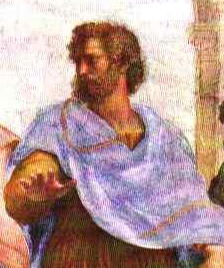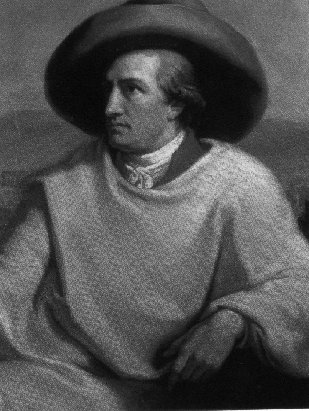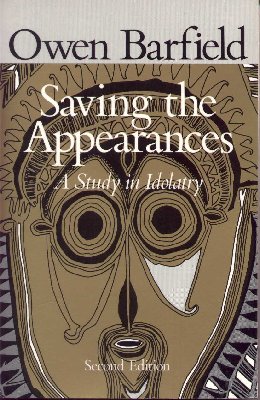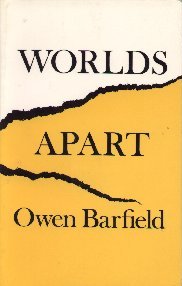
Aristotle

Goethe
| Science |
Science, we are told in "The Fall in Man and Nature," is "the study of fallen nature carried on by fallen man" (RCA 214). His writings offer numerous other semi-detached observations on the meaning and effects of science and the scientific revolution:
- The philosophy of Everyman could perhaps best be summed up in the simple proposition: science must be true because it works. (RM 183)
- A philosophy, or scienti-philosophy--let us call it a scientism--which has reached the stage of abolishing the "thing," will go on to abolish the mind. (PD 31)
- [Science] treats nature as an invading army treats an occupied country, mixing as little as possible with the inhabitants. (PD 32)
- Science (the causality-science which is all we yet have) is clearly the most impenetrable of the prison walls we call "common sense." (HGH 82)
- When the nature of objectivity itself becomes (as for instance in modern physics) part of the problem of method, science is in a measure pitchforked into philosophy. (RM 179)
- For me the use of mathematics and of the inductive method are not the essential thing in science. It is the scientific spirit that is essential: the regarding of knowledge as an end in itself; absolute open-mindedness; elimination of all personal bias--and the refusal to admit that there is anything which we cannot, or ought not to, know. (WA 139)
- It seems to [me] that certain wide consequences flowing from the hastily expanded sciences of the nineteenth and twentieth centuries, and in particular their physics, have not been sufficiently considered in building up the general twentieth-century picture of the nature of the universe and of the history of the earth and man. (SA 17)
- Physical science postulates an unrepresented, as a something which is independent of our consciousness in a way, or to an extent to which the phenomena are not. Our consciousness is, however, not independent of it; for it is in response to its stimulus that our senses and our figuration and thinking together construct the phenomenal world. It has however lately been growing apparent that all attempts to conceive the unrepresented in terms of idol-matter in idol-space and idol-time break down. Approaching it this way, we learn only that by taking it up into mathematical equations we can produce startling technological results. (SA 153)
- If we are seeking to have to do with spirit, it is worse than useless to try to approach it by way of scientific investigation--at least as the word 'science" is used today, for science is avowedly based on mere perception, and in mere perception it will always be matter we are having to do with and never spirit. Indeed mere perception is itself the gap between matter and spirit and, whatever else one can do with a gap, one cannot use it as a means of crossing itself. (RM 150)
- Science, with the progressive disappearance of original participation, is losing its grip on any principle of unity pervading nature as a whole and the knowledge of nature. The hypothesis of chance has already crept from the theory of evolution into the theory of the physical foundation of the earth itself; but more serious perhaps than that is the rapidly increasing "fragmentation of science" . . . There is no "science of sciences"; no unity of knowledge. There is only an accelerating increase in that pigeon-holed knowledge by individuals of more and more about less and less, which, if persisted in indefinitely, can only lead mankind to a sort of "idiocy" . . . a state of affairs, in which fewer and fewer representations will be collective, and more and more will be private, with the result that there will in the end be no means of communication between one intelligence and another" (SA 145).
- Why should the scientific revolution have occurred when it did, and at no other time, although men had been busy saving the appearances by abstract hypothesis for century after century? We might be tempted to answer this question by saying that it came when alpha-thinking had succeeded in developing more efficient instruments of observation, so that observations of the phenomena themselves became at last a viable and more attractive alternative to the traditional medieval practice of merely glossing Aristotle. (SA 68)
As early as Poetic Diction, Barfield was convinced that "what is needed is, not only that larger and larger telescopes and more and more sensitive calipers should be constructed, but that the human mind should become increasingly aware of its own creative activity" (PD 28).1 And he remained persuaded of not only the axiomatic truth that "the mind cannot refer to a natural object without at the same time referring to its own activity," but of the "equally unforced awareness not only that scientific discovery is always a discovery about language, but also that it is always a discovery about the self which uses language" (RM 139),2 Barfield wants to see a new kind of alternative science and, drawing on the example already provided by Goethe (and others), he has gone a long way toward thinking it through.[Modern scientists] fancy that, if you turn round quickly enough, you will see the back of your head in the mirror.
. . . [They] are like children thinking they can have it both ways. First they insist on cutting out awe and reverence and wisdom and substituting sophistication as the goal of knowledge; and then they talk about this method of theirs with reverence and awe and expect us to look up to them as wise and venerable men. (22)
"No doubt the world can be thought of as a sequence of causes and effects," he writes in History, Guilt, and Habit; "but it can also be thought of as"
In the long run, "What will chiefly be remembered about the scientific revolution will be the way in which it scoured the appearances clean of the last traces of spirit, freeing us from original and for final participation" (SA 185).a sequence of patterns, of forms changing into other forms. One can go further than that. Can the life in nature really be adequately thought in any other way? By treating it exclusively as a sequence of cause and effects, are we not in effect struggling to grasp the whole of nature with the imprisoned thinking that is in truth only applicable to the inanimate part of it? It was a firm conviction to that effect that made Goethe, at the end of his life, attach more importance to his scientific than to his literary output. (82)
| See in particular Saving the Appearances, passim, Worlds Apart, passim, "Science and Quality" (RM 176-86). |
1"Science,"
Barfield knew in 1928,
|
2Earlier
in the century, under the sanction of logical positivism and linguistic
analysis, an attempt had been made to reconsider the role of language in
scientific reasoning, but as Barfield makes clear in the following account
(from Poetic Diction), the result was wholly unsatisfying and completely
reductionistic:
|

